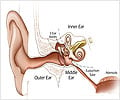Scientists have identified a new gene, which may provide insights into the development of presbycusis, or age-related hearing loss.
Scientists have identified a new gene, which may provide insights into the development of presbycusis, or age-related hearing loss.
"This is the first ever and largest genome-wide association study for age-related hearing loss," said Rick Friedman, M.D., Ph.D., lead author and House Ear Institute principal investigator and surgeon at the House Clinic.The study was conducted in collaboration with colleagues at the Phoenix-based Translational Genomics Research Institute (TGen), Affymetrix in Santa Clara, Calif., and the University of Antwerp, Belgium.
During their study, the researchers discovered a common variant in the GRM7 gene, which the research team believes may be associated with susceptibility to glutamate excitotoxicity and hearing loss.
It is the overexpression of glutamate that causes damage to the inner and outer hair cells in the inner ear leading to age-related hearing loss.
According to the researchers, the findings represent important and significant progress in the efforts to discover the origins of presbycusis.
Guy Van Camp, director of the Hereditary Deafness Laboratory and professor, University of Antwerp, Belgium, said: "We have known for a long time that genes play an important role in presbycusis, but until now genetic research has lagged behind compared to other important diseases. The identification of GRM7 is a very exciting result, as it may provide insights in the development of the disease."
Advertisement
The team of investigators analyzed the samples and identified genetic risks.
Advertisement
Friedman said the next step is developing a laboratory model to test pharmaceuticals for possible treatment of presbycusis in the future.
The study has been published online in the journal Human Molecular Genetics.
Source-ANI
LIN










